15 books about Ethnographic Theory

HAU
Journal of Ethnographic Theory, volume 11 number 1 (Spring 2021)
The University of Chicago Press
University of Chicago Press Journals, 2021
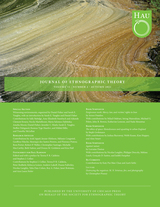
HAU
Journal of Ethnographic Theory, volume 11 number 2 (Autumn 2021)
The University of Chicago Press
University of Chicago Press Journals, 2021
This is volume 11 issue 2 of HAU: Journal of Ethnographic Theory. HAU: Journal of Ethnographic Theory, is an international journal which aims to situate ethnography as the prime heuristic of anthropology, and return it to the forefront of conceptual developments in the discipline. The journal is motivated by the need to reinstate ethnographic theorization in contemporary anthropology as a potent alternative to its "explanation" or "contextualization" by philosophical arguments, moves which have resulted in a loss of the discipline's distinctive theoretical nerve. By drawing out its potential to critically engage and challenge Western cosmological assumptions and conceptual determinations, HAU aims to provide an exciting new arena for evaluating ethnography as a daring enterprise for 'worlding' alien terms and forms of life, by exploiting their potential for rethinking humanity and alterity.
[more]

HAU
Journal of Ethnographic Theory, volume 11 number 3 (Winter 2021)
The University of Chicago Press
University of Chicago Press Journals, 2021
This is volume 11 issue 3 of HAU: Journal of Ethnographic Theory. HAU: Journal of Ethnographic Theory, is an international journal which aims to situate ethnography as the prime heuristic of anthropology, and return it to the forefront of conceptual developments in the discipline. The journal is motivated by the need to reinstate ethnographic theorization in contemporary anthropology as a potent alternative to its "explanation" or "contextualization" by philosophical arguments, moves which have resulted in a loss of the discipline's distinctive theoretical nerve. By drawing out its potential to critically engage and challenge Western cosmological assumptions and conceptual determinations, HAU aims to provide an exciting new arena for evaluating ethnography as a daring enterprise for 'worlding' alien terms and forms of life, by exploiting their potential for rethinking humanity and alterity.
[more]
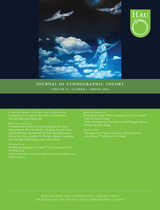
HAU
Journal of Ethnographic Theory, volume 12 number 1 (Spring 2022)
The University of Chicago Press
University of Chicago Press Journals, 2022
This is volume 12 issue 1 of HAU: Journal of Ethnographic Theory. HAU: Journal of Ethnographic Theory, is an international journal which aims to situate ethnography as the prime heuristic of anthropology, and return it to the forefront of conceptual developments in the discipline. The journal is motivated by the need to reinstate ethnographic theorization in contemporary anthropology as a potent alternative to its "explanation" or "contextualization" by philosophical arguments, moves which have resulted in a loss of the discipline's distinctive theoretical nerve. By drawing out its potential to critically engage and challenge Western cosmological assumptions and conceptual determinations, HAU aims to provide an exciting new arena for evaluating ethnography as a daring enterprise for 'worlding' alien terms and forms of life, by exploiting their potential for rethinking humanity and alterity.
[more]
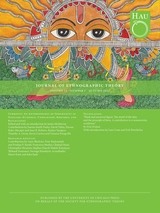
HAU
Journal of Ethnographic Theory, volume 12 number 2 (Autumn 2022)
The University of Chicago Press
University of Chicago Press Journals, 2022
This is volume 12 issue 2 of HAU: Journal of Ethnographic Theory. HAU: Journal of Ethnographic Theory, is an international journal which aims to situate ethnography as the prime heuristic of anthropology, and return it to the forefront of conceptual developments in the discipline. The journal is motivated by the need to reinstate ethnographic theorization in contemporary anthropology as a potent alternative to its "explanation" or "contextualization" by philosophical arguments, moves which have resulted in a loss of the discipline's distinctive theoretical nerve. By drawing out its potential to critically engage and challenge Western cosmological assumptions and conceptual determinations, HAU aims to provide an exciting new arena for evaluating ethnography as a daring enterprise for 'worlding' alien terms and forms of life, by exploiting their potential for rethinking humanity and alterity.
[more]
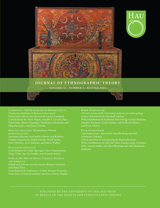
HAU
Journal of Ethnographic Theory, volume 12 number 3 (Winter 2022)
The University of Chicago Press
University of Chicago Press Journals, 2022
This is volume 12 issue 3 of HAU: Journal of Ethnographic Theory. HAU: Journal of Ethnographic Theory, is an international journal which aims to situate ethnography as the prime heuristic of anthropology, and return it to the forefront of conceptual developments in the discipline. The journal is motivated by the need to reinstate ethnographic theorization in contemporary anthropology as a potent alternative to its "explanation" or "contextualization" by philosophical arguments, moves which have resulted in a loss of the discipline's distinctive theoretical nerve. By drawing out its potential to critically engage and challenge Western cosmological assumptions and conceptual determinations, HAU aims to provide an exciting new arena for evaluating ethnography as a daring enterprise for 'worlding' alien terms and forms of life, by exploiting their potential for rethinking humanity and alterity.
[more]
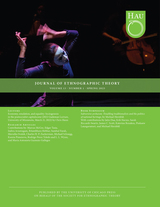
HAU
Journal of Ethnographic Theory, volume 13 number 1 (Spring 2023)
The University of Chicago Press
University of Chicago Press Journals, 2023
This is volume 13 issue 1 of HAU: Journal of Ethnographic Theory. HAU: Journal of Ethnographic Theory, is an international journal which aims to situate ethnography as the prime heuristic of anthropology, and return it to the forefront of conceptual developments in the discipline. The journal is motivated by the need to reinstate ethnographic theorization in contemporary anthropology as a potent alternative to its "explanation" or "contextualization" by philosophical arguments, moves which have resulted in a loss of the discipline's distinctive theoretical nerve. By drawing out its potential to critically engage and challenge Western cosmological assumptions and conceptual determinations, HAU aims to provide an exciting new arena for evaluating ethnography as a daring enterprise for 'worlding' alien terms and forms of life, by exploiting their potential for rethinking humanity and alterity.
[more]
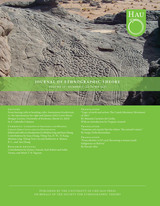
HAU
Journal of Ethnographic Theory, volume 13 number 2 (Autumn 2023)
The University of Chicago Press
University of Chicago Press Journals, 2023
This is volume 13 issue 2 of HAU: Journal of Ethnographic Theory. HAU: Journal of Ethnographic Theory, is an international journal which aims to situate ethnography as the prime heuristic of anthropology, and return it to the forefront of conceptual developments in the discipline. The journal is motivated by the need to reinstate ethnographic theorization in contemporary anthropology as a potent alternative to its "explanation" or "contextualization" by philosophical arguments, moves which have resulted in a loss of the discipline's distinctive theoretical nerve. By drawing out its potential to critically engage and challenge Western cosmological assumptions and conceptual determinations, HAU aims to provide an exciting new arena for evaluating ethnography as a daring enterprise for 'worlding' alien terms and forms of life, by exploiting their potential for rethinking humanity and alterity.
[more]
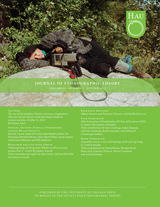
HAU
Journal of Ethnographic Theory, volume 13 number 3 (Winter 2023)
The University of Chicago Press
University of Chicago Press Journals, 2023
This is volume 13 issue 3 of HAU: Journal of Ethnographic Theory. HAU: Journal of Ethnographic Theory, is an international journal which aims to situate ethnography as the prime heuristic of anthropology, and return it to the forefront of conceptual developments in the discipline. The journal is motivated by the need to reinstate ethnographic theorization in contemporary anthropology as a potent alternative to its "explanation" or "contextualization" by philosophical arguments, moves which have resulted in a loss of the discipline's distinctive theoretical nerve. By drawing out its potential to critically engage and challenge Western cosmological assumptions and conceptual determinations, HAU aims to provide an exciting new arena for evaluating ethnography as a daring enterprise for 'worlding' alien terms and forms of life, by exploiting their potential for rethinking humanity and alterity.
[more]

HAU
Journal of Ethnographic Theory, volume 14 number 1 (Spring 2024)
The University of Chicago Press
University of Chicago Press Journals, 2024
This is volume 14 issue 1 of HAU: Journal of Ethnographic Theory. HAU: Journal of Ethnographic Theory, is an international journal which aims to situate ethnography as the prime heuristic of anthropology, and return it to the forefront of conceptual developments in the discipline. The journal is motivated by the need to reinstate ethnographic theorization in contemporary anthropology as a potent alternative to its "explanation" or "contextualization" by philosophical arguments, moves which have resulted in a loss of the discipline's distinctive theoretical nerve. By drawing out its potential to critically engage and challenge Western cosmological assumptions and conceptual determinations, HAU aims to provide an exciting new arena for evaluating ethnography as a daring enterprise for 'worlding' alien terms and forms of life, by exploiting their potential for rethinking humanity and alterity.
[more]
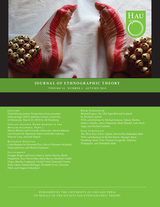
HAU
Journal of Ethnographic Theory, volume 14 number 2 (Autumn 2024)
The University of Chicago Press
University of Chicago Press Journals, 2024
This is volume 14 issue 2 of HAU: Journal of Ethnographic Theory. HAU: Journal of Ethnographic Theory, is an international journal which aims to situate ethnography as the prime heuristic of anthropology, and return it to the forefront of conceptual developments in the discipline. The journal is motivated by the need to reinstate ethnographic theorization in contemporary anthropology as a potent alternative to its "explanation" or "contextualization" by philosophical arguments, moves which have resulted in a loss of the discipline's distinctive theoretical nerve. By drawing out its potential to critically engage and challenge Western cosmological assumptions and conceptual determinations, HAU aims to provide an exciting new arena for evaluating ethnography as a daring enterprise for 'worlding' alien terms and forms of life, by exploiting their potential for rethinking humanity and alterity.
[more]
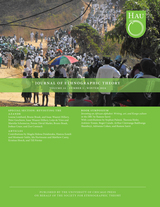
HAU
Journal of Ethnographic Theory, volume 14 number 3 (Winter 2024)
The University of Chicago Press
University of Chicago Press Journals, 2024
This is volume 14 issue 3 of HAU: Journal of Ethnographic Theory. HAU: Journal of Ethnographic Theory, is an international journal which aims to situate ethnography as the prime heuristic of anthropology, and return it to the forefront of conceptual developments in the discipline. The journal is motivated by the need to reinstate ethnographic theorization in contemporary anthropology as a potent alternative to its "explanation" or "contextualization" by philosophical arguments, moves which have resulted in a loss of the discipline's distinctive theoretical nerve. By drawing out its potential to critically engage and challenge Western cosmological assumptions and conceptual determinations, HAU aims to provide an exciting new arena for evaluating ethnography as a daring enterprise for 'worlding' alien terms and forms of life, by exploiting their potential for rethinking humanity and alterity.
[more]

HAU
Journal of Ethnographic Theory, volume 15 number 1 (Spring 2025)
The University of Chicago Press
University of Chicago Press Journals, 2025
This is volume 15 issue 1 of HAU: Journal of Ethnographic Theory. HAU: Journal of Ethnographic Theory, is an international journal which aims to situate ethnography as the prime heuristic of anthropology, and return it to the forefront of conceptual developments in the discipline. The journal is motivated by the need to reinstate ethnographic theorization in contemporary anthropology as a potent alternative to its "explanation" or "contextualization" by philosophical arguments, moves which have resulted in a loss of the discipline's distinctive theoretical nerve. By drawing out its potential to critically engage and challenge Western cosmological assumptions and conceptual determinations, HAU aims to provide an exciting new arena for evaluating ethnography as a daring enterprise for 'worlding' alien terms and forms of life, by exploiting their potential for rethinking humanity and alterity.
[more]
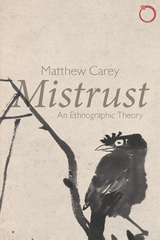
Mistrust
An Ethnographic Theory
Matthew Carey
HAU, 2017
Trust occupies a unique place in contemporary discourse. Seen as both necessary and virtuous, it is variously depicted as enhancing the social fabric, lowering crime rates, increasing happiness, and generating prosperity. It allows for complex political systems, permits human communication, underpins financial instruments and economic institutions, and generally holds society together. Against these overwhelmingly laudable qualities, mistrust often goes unnoticed as a positive social phenomenon, treated as little more than a corrosive absence, a mere negative of trust itself. With this book, Matthew Carey proposes an ethnographic and conceptual exploration of mistrust that raises it up as legitimate stance in its own right.
While mistrust can quickly ruin relationships and even dissolve extensive social ties, Carey shows that it might have other values. Drawing on fieldwork in Morocco’s High Atlas Mountains as well as comparative material from regions stretching from Eastern Europe to Melanesia, he examines the impact of mistrust on practices of conversation and communication, friendship and society, and politics and cooperation. In doing so, he demonstrates that trust is not the only basis for organizing human society and cooperating with others. The result is a provocative but enlightening work that makes us rethink social issues such as suspicion, doubt, and uncertainty.
While mistrust can quickly ruin relationships and even dissolve extensive social ties, Carey shows that it might have other values. Drawing on fieldwork in Morocco’s High Atlas Mountains as well as comparative material from regions stretching from Eastern Europe to Melanesia, he examines the impact of mistrust on practices of conversation and communication, friendship and society, and politics and cooperation. In doing so, he demonstrates that trust is not the only basis for organizing human society and cooperating with others. The result is a provocative but enlightening work that makes us rethink social issues such as suspicion, doubt, and uncertainty.
[more]
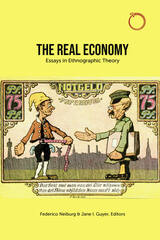
The Real Economy
Essays in Ethnographic Theory
Edited by Federico Neiburg and Jane I. Guyer
HAU, 2020
This collection highlights a key metaphor in contemporary discourse about economy and society. The contributors explore how references to reality and the real economy are linked both to the utopias of collective well-being, supported by real monies and good economies, and the dystopias of financial bubbles and busts, in which people’s own lives “crash” along with the reality of their economies.
An ambitious anthropology of economy, this volume questions how assemblages of vernacular and scientific realizations and enactments of the economy are linked to ideas of truth and moral value; how these multiple and shifting realities become present and entangle with historically and socially situated lives; and how the formal realizations of the concept of the “real” in the governance of economies engage with the experiential lives of ordinary people. Featuring essays from some of the world’s most prominent economic anthropologists, The Real Economy is a milestone collection in economic anthropology that crosses disciplinary boundaries and adds new life to social studies of the economy.
An ambitious anthropology of economy, this volume questions how assemblages of vernacular and scientific realizations and enactments of the economy are linked to ideas of truth and moral value; how these multiple and shifting realities become present and entangle with historically and socially situated lives; and how the formal realizations of the concept of the “real” in the governance of economies engage with the experiential lives of ordinary people. Featuring essays from some of the world’s most prominent economic anthropologists, The Real Economy is a milestone collection in economic anthropology that crosses disciplinary boundaries and adds new life to social studies of the economy.
[more]
READERS
Browse our collection.
PUBLISHERS
See BiblioVault's publisher services.
STUDENT SERVICES
Files for college accessibility offices.
UChicago Accessibility Resources
home | accessibility | search | about | contact us
BiblioVault ® 2001 - 2025
The University of Chicago Press









